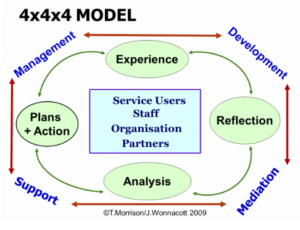Effective supervision is, possibly, one of the most underestimated functions of management. Good supervision is essential to ensure staff deliver to the quality and standards expected of them and to enable organisations not just to meet their objectives but also to do so in a way that also supports its values. It becomes even more important when professional staff, such as those working in social care, health or children’s services are in positions of trust and working with individuals and families in isolated (and, hence, not monitored) environments. For the individual, effective supervision also plays a key part in personal and professional development. According to the Care Act Statutory Guidance: “Regular face-to-face supervision and reflective practice, from skilled managers is essential to support staff, and to enable staff to work confidently and competently with difficult and sensitive situations”
We use the Morrison 4x4x4 Model of Supervision. This is an adaption of Kolb’s Reflective model for professional staff in health and care services. It is based on one’s our own experience, which is then reviewed, analysed and evaluated systematically in three stages and once this process has been completed, the new experiences will form the starting point for another cycle.
As Morrison stated: “Supervision is a process by which one worker is given responsibility by the organisation to work with another worker(s) in order to meet certain organisation, professional and personal objectives which together promote the best outcomes for service users.”
Diagrammatically, the model is shown below.

Morrison created the model for supervision in social care to provide a framework to support effective supervision across a wide range of services. It is made up of three interconnected aspects
Having been trained by Morrison himself, Phillida Miles has been training supervisors and supervisees in health and social care services for over ten years across many organisations in the UK and for senior managers in the Caribbean island of Turks and Caicos.